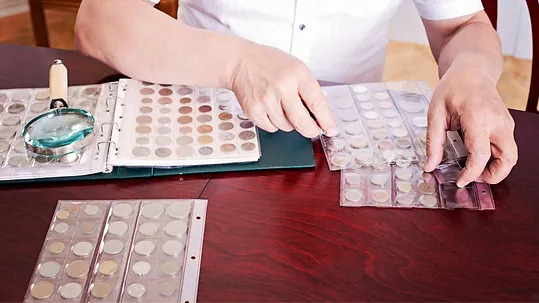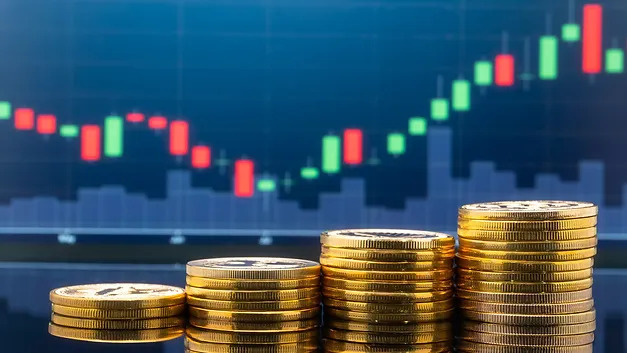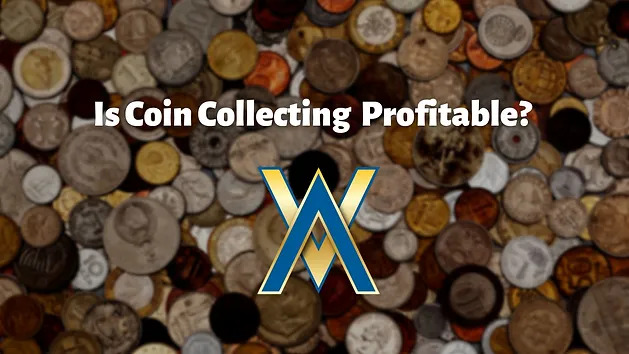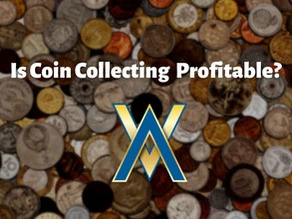Is Coin Collecting Profitable, or just a Fun Hobby?
The answer to this question depends on a number of factors, including the type of coins you collect, the condition they are in, and how you go about selling them.
Is coin collecting a Good Investment?
Throughout the course of history, investing in coins has proven to be a lucrative venture for many collectors and investors alike. This holds particularly true for coin collectors in the past century. As an example, a man named Harold Bareford is said to have acquired a collection of US gold coins for $13,832 in the early 1950s which was later sold at auction in 1978 for $1.2 million, yielding significant profits.
Coin collecting can indeed be profitable, but its profitability largely depends on various factors. These include the type of coins you collect, their condition, and the strategy you employ when selling them. While some collectors focus on the historical and artistic value of coins, others view them as a form of investment.
Just like any other investment, it's essential to have a deep understanding of the market and to stay updated with current trends. For those who are keen on understanding the value of their collection, there are easy ways to determine the value of a coin.
Another way to make money from coin collecting is to buy coins that are in good condition and then sell them for a higher price later on, much like buying and holding stocks.
As with any type of investment, it's important to understand that there are risks, and not every coin is going to yield a significant return or even any return in some cases.
What Kind of Coins Make Money?
Most coins that are rare today started out as common issues struck in large quantities by the United States Mint. Even though thousands or even millions of copies of a particular coin were originally minted, after many decades, the vast majority were worn out in circulation, lost, or destroyed.
Coins minted in limited quantities, error coins, and older proof issues are also sought after by collectors and investors. Additionally, coins with historical significance or those from certain eras can be valuable. If you're new to coin collecting and want to understand which coins to start with, view our guide on how to start a coin collection.
Note that rarity refers to more than just the number of coins in existence. It is also a function of investor/collector demand for the coin. If a coin is said to be rare or scarce, it implies that the available quantity is small relative to the current demand from collectors and investors. This can make it difficult (and expensive) to find examples of these rare coins for your collection.
Coin Collecting as a Hobby
Coin collecting is one of the most popular hobbies in the world. There are millions of coins from dozens of countries to be collected!
It can be a fascinating and rewarding hobby as it allows you to learn about history, art, culture, and even geography, while also providing the satisfaction of finding and adding valuable and rare coins to your collection. Many collectors also enjoy the social aspect of the hobby, such as attending coin shows, joining clubs, and interacting with fellow enthusiasts.
Should I Invest In Gold Or Silver Coins?
Deciding whether to focus on gold or silver bullion coins for investment purposes will depend on your personal preferences, investment goals, and market trends.
Precious metals like gold and silver have been viewed as safe haven investments throughout periods of economic uncertainty. Why? The price consistently increases year over year.
Gold coins can be more expensive to purchase due to their higher intrinsic value. However, they are historically less volatile than silver and can act as a hedge against inflation.
Silver coins, on the other hand, are often more affordable than gold coins and may be a better option for beginners or those with a limited budget. They can also offer greater diversification to a portfolio, as they are used in a wide range of industries, including electronics, medicine, and solar power. However, silver coins may be more volatile in terms of pricing and may be subject to greater price fluctuations than gold coins.
Is Coin Collection a Hobby or An Investment?
So, is coin collecting a hobby or an investment? Well, it can be both! If you are only interested in the fun and challenge of collecting coins then by all means collect whatever interests you. However, if you want to make money as well, focus on rare coins that are likely to increase in value over time. With a little research and some expert advice, coin collecting can be both a rewarding pastime and a profitable investment.
Is It Worth Keeping Old Coins I Find?
So is it worth keeping the old collection you found in your grandparents' attic?
Absolutely! Those old coins can hold significant historical, artistic, and monetary value. Even coins that were once common can become rare over time due to wear, loss, or destruction. Keeping old coins, especially those in good condition, can be a wise decision as they might appreciate in value over the years.
Note that just because a coin is old does not mean it is of a high value. If you're unsure about the value of your old coins, consider getting an appraisal.
Ultimately, it's really a matter of preference, budget, and knowledge. Make sure to do thorough research and consult with a reputable coin dealer or investment advisor before making any investment decisions. This will help ensure that you make an informed decision based on your personal financial situation and investment goals.





